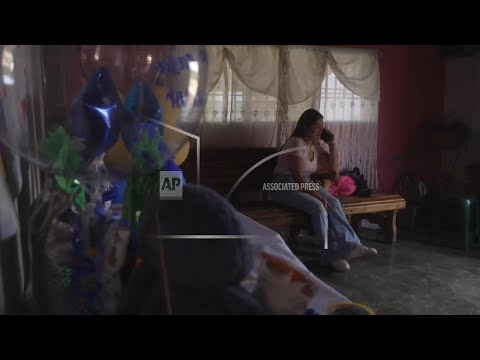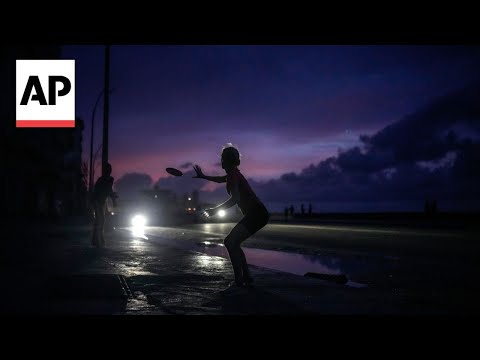(23 Jul 2025)
RESTRICTION SUMMARY:
ASSOCIATED PRESS
Lobatera, Tachira, Venezuela – 22 July 2025
1. Gabriela Mora, wife of deportee Carlos Uzcategui, looking at her phone
2. Various of Mora having a conversation on the phone with the mother of another detainee UPSOUND (Spanish):
Mora: "Look at the picture of that beautiful boy I sent you" "
Friend "Oh, my lord! wait a minute! Oh my god! Look at my boy how beautiful he is looking!"
3. Wide of Mora and friends listening to the phone on speaker. UPSOUND (Spanish): "They are stranded (the bus broke down)
4. Mother and sister of Uzcategui sitting next to each other
5. Relatives arranging welcome decorations for Uzcategui
6. Mora speaking on the phone
7. SOUNDBITE (Spanish) Gabriela Mora, wife of deportee Carlos Uzcategui:
"It’s anguishing but I’m happy. I feel that my soul is back to my body, that a missing part of me is coming home, that what I need to be happy is coming back home. Carlos and my daughter are what I need to be happy."
ASSOCIATED PRESS
Capacho, Tachira, Venezuela – 22 July 2025
8. Various of Felipe Hernandez, father of deportee Andry Hernandez, smoking while waiting for his soon to arrive home
9. Hernandez and hs youngest son at house garage
10. SOUNDBITE (Spanish) Felipe Hernandez, father of deportee Andry Hernandez:
"I want to hug him and say to him that I love him very much and that he arrives back to his home"
11. Various of Andry Hernandez’s house decorated with a Venezuelan flag, a picture of him, clothes and Three Kings costumes he used to wear during annual Three Kings celebration where he used to perform in his hometown.
STORYLINE:
Gabriela Mora didn’t take her eyes off her phone as Tuesday’s hours dragged on. Her husband, Carlos Uzcátegui, was finally on his way home after leaving Venezuela, being detained in the U.S. and deported to imprisonment without due process.
Uzcategui, like more than 200 other Venezuelans, was first detained under an 18th-century wartime law, the Alien Enemies Act, which allows non-citizens to be deported from the U.S. without the opportunity to go before an immigration or federal court judge.
The Venezuelans were accused of belonging to the international ‘Tren de Aragua’ gang, and spent four months in El Salvador, confined in a high-security prison.
Uzcategui and the rest were released from El Salvador mega-prison Friday after Venezuela and the U.S. negotiated a prisoner swap.
But until Tuesday evening, Uzcategui and a group of the deportees were delayed once more.
The bus they took on a cross-country road trip broke down.
While in other states, some deportees had already been reunited with their families, in the Andean state of Tachira, the families had to wait a bit longer.
The anxiety among the relatives was overshadowed by the joy of seeing their sons, brothers, or fathers in pictures sent through various WhatsApp groups.
Uzcategui had left Táchira state in 2024 after losing his job at a coal mine, hoping to find construction work in the U.S.
While attending an immigration hearing for his asylum request, authorities accused Uzcategui of belonging to the Tren de Aragua gang — an allegation his family strongly denies.
“It’s anguishing but I’m happy, I feel my soul is coming back to my body,” Mora said
In the nearby town of Capacho, Andry Hernández’s father sat in his garage, cigarette in hand — a habit he quit, sparked by the nerves of waiting.
"I want to hug him and say to him that I love him very much," Hernandez said.
That’s where authorities questioned him about his tattoos.
AP video by Juan Arraez
Find out more about AP Archive: http://www.aparchive.com/HowWeWork
Twitter: https://twitter.com/AP_Archive
Facebook: https://www.facebook.com/APArchives
Instagram: https://www.instagram.com/APNews/
You can license this story through AP Archive: http://www.aparchive.com/metadata/youtube/9529eb2c20754d7da6b214b28fe4fc8e
Author: AP Archive
Go to Source
News post in July 28, 2025, 3:05 am.
Visit Our Sponsor’s:
News Post In – News





